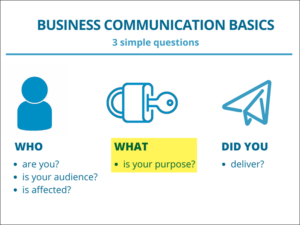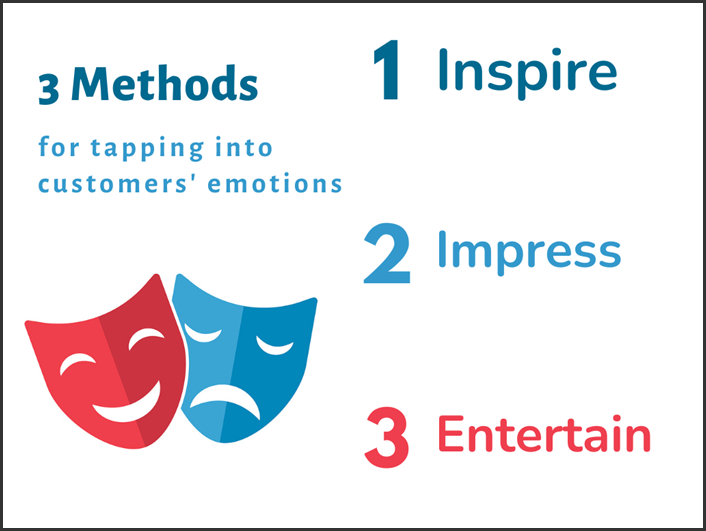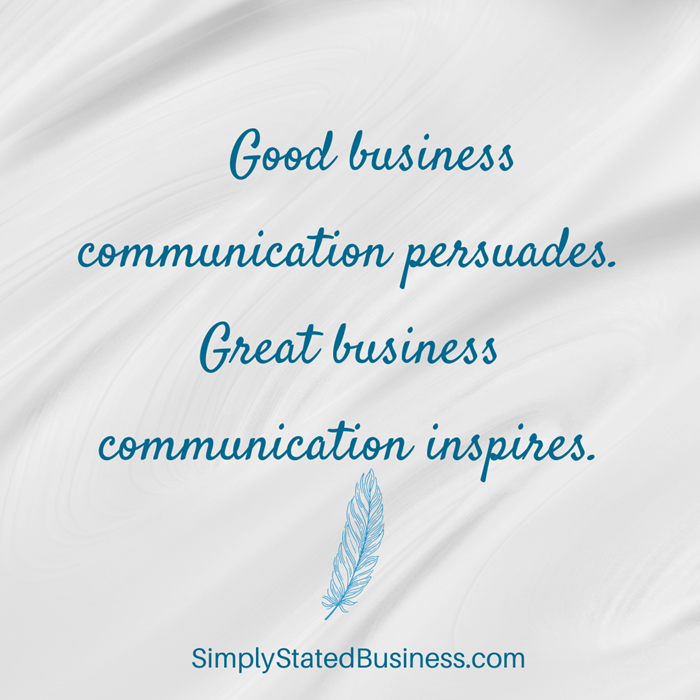Part of the What is Your Purpose series

What makes you feel good about a person you meet for the first time? It’s probably not the pushy salesperson.
 You know the type. With pearly whites flashing, he or she gushes how simply wonderful it is to meet you. That’s followed with a steamrolling sales pitch.
You know the type. With pearly whites flashing, he or she gushes how simply wonderful it is to meet you. That’s followed with a steamrolling sales pitch.
The greeting shuts down any chance of you listening to whatever he or she was selling.
This post covers the second question of business communication’s purpose – what do you want your audience to feel?
That Feel Good Moment
Wouldn’t you love your audience to feel good about your business communication? But feeling good about it may go beyond a single emotion.
For example, I am a subscriber to Sharon Hurley Hall’s Anti-Racism Newsletter. I am very glad I signed up, but each newsletter can cause a wide range of emotions.
- Shame
- Embarrassment
- Anger
- Disgust
- Surprise
Despite times when what I read makes me uncomfortable, I feel good that I am educating myself to be a better person and ally.
Emotional Response
When defining your business communication’s purpose, consider the emotional response you want.
Depending on which scientific study you buy into, the types of basic emotions are identified from four to ten categories. Making an emotional connection to what you want others to know can be powerful.
So, how do emotions affect your business communication? The following are a few ideas.
- Happiness makes us want to share (as presented in this interesting article on emotions and marketing).
- Sadness generates empathy (picture the animal rescue commercials or a St. Jude ad).
- Fear can be the subtle push to buy a product before the supply runs out.
- Surprise sprinkles a highly valued, unique flavor in ho-hum marketing.
- Anger can propel much-needed change.
So how do you tap into those emotions without sounding like that smarmy salesperson?
Multiple methods exist for harnessing the power of your audience’s emotions. My love of simple chiseled those into the following three categories.

1. Inspire your audience
Being told to inspire your audience is like telling someone to do great things. Um, okay, I’ll get right on that.
The overabundance of motivational speakers and self-professed gurus lure you into believing inspiration is a snap. But think about the last “expert” you heard or read.
- Perhaps you bought what they were selling, but did they inspire you?
- Or merely persuade you to buy their service?
What’s the difference?
Picture your favorite product or service. Let’s say it’s the latest Apple product or Amazon’s customer service. When you look for a new smartphone or want to find a product online, where do you go? Apple or Amazon, right?
- You have gone beyond mere purchasing.
- You are an Apple advocate, an Amazon ambassador.

Inspire greatness — go beyond.
- Know your audience – Anticipate their needs, feel their pain, listen to what they are saying (and not saying).
- Take the extra step – Acknowledge correspondence (beware of automated turn-offs), follow up, follow up, follow up, and say thank you – often.
- Keep it real – Automated “do not reply” and patronizing rhetoric (we appreciate your call; the next available representative will be with you in 30 minutes…BEEP) are masks disguised as customer service.
2. Impress your audience
Do you know what factor does more to impress your audience than any other?
Great customer service
Think about it.
- Are you surprised when you receive good customer service?
- Sad commentary, isn’t it?
This SlideShare presentation is one of my most downloaded. It offers simple tips for putting the WOW into your customer service.
I also updated it to a video format, which you can access on YouTube.
Sadly, good customer service is often a surprise. Make good customer service your norm. Share on X3. Entertain your audience
You do not have to be the next Robin Williams to entertain your audience. Isn’t that a relief? However, if you (or someone in your business) has a fantastic way with humor, use it to your advantage.
One of my favorite businesses for their great sense of humor (in my humble opinion) is Southwest Airlines. One of my favorite ads is Southwest’s available seating chart.

Humor is tricky. Who hasn’t been offended by the content of an email, only to find out the sender intended the message to be funny or sarcastic. Be aware of potential pitfalls.
Humor is not the only way business communication entertains.
Entertain through:
- Storytelling to illustrate points
- Various mediums like video, podcasts, and presentations
- Images, memes, and other visuals
Inspire – Impress – Entertain
How do you make your audience feel good? Share your tips in Comments.
Note: The next post reviews how you communicate what you want your audience to do.
===================================
Note: This post originally published on May 16, 2016. This September 6, 2022 version updates it.
===================================

Right on… love the SW airline seating chart.
I write a blog for real estate agents and I keep hammering that they are in a service business. Any business is in a service business… how can they really serve and you say this one way or another over and over again.
Isn’t the chart a crack-up, Anne? 🙂 When you think about it, we are all in a service business – some more than others. Thanks, Anne.
It is a fine line. We want our clients, our customers to receive the best service. But, having our sales/tech support people hover over them does not yield the best service.
It has been our policy to recommend the provision of great support information that a client/customer can peruse (which may be handed to them, posted, etc.). But, we also must make clear they can reach (in person, on phone, via the web) a truly knowledgeable individual that will help them choose among the wares, should they want such help. The key is to avoid the upsale, to avoid “bundling” items that are not wanted. Even though they generate more profits for our firms.
Boy, you should teach the cable companies, Roy. 😀
arghhhhh – shortly after I read this article I had two horrid customer service issues.
The first was an inquiry about what I charge for paid or sponsored posts on one of my blogs – the company looked legit and I did some research and came up with a price, a price incidentally I’ve actually received in the past. I quoted that price and was almost immediately told my blog wasn’t worth nearly that much. I responded with ok, you’re welcome to make offers if you want. He fired back “I won’t discuss this anymore!”
Then I decided I wanted to cancel my Amazon Kindle Unlimited subscription – I’m not using it and it was costing me almost $10 a month… not a fortune, but still. I couldn’t find out how even by googling but did find a customer service number so I called. When I got a person and explained what I wanted she asked me why – I’m not sure that’s a good approach, but I answered. She then launched into a speech asking if I understood the benefits I would be giving up – they cancel the books you downloaded under that plan which is fine by me. I stopped her apologizing for not making myself clear and repeated I want to cancel my Kindle Unlimited subscription… after another go round or two she did… or said she did. No way to tell for sure that I can find.
These kinds of communications I can do without.
Boggles my mind every time, Anne. In the first call, how is insulting a potential resource ever a good idea? It’s a small world and that person you insulted could be a missed opportunity.
The 2nd one reminded me of when we called to have our paper subscription cut from daily to weekend only. My mom has been a subscriber for 40+ years and it just got ridiculously expensive. When we called, they immediately offered a reduction of over $20 per pay period. Instead of waiting until a client cancels, why not give her the same deal you would for someone who is brand new? Makes no sense to me.
BTW, we didn’t change our mind on the weekend subscription. You know they would only increase the subscription again at a later date.
Cathy:
One of my first lessons in business: Some businesses survive in spite of themselves! And by this I mean, it’s a wonder how well they do because they seem to be awful—terrible customer care, inappropriate businesss dealings, product problems, whatever—and yet they do well and always have business and make money. It boggles the mind. (Like you said) For me, I’ve always been a “nice” business, I think, maybe because I care and business to me is about a whole lot more than just making money. I don’t know why or how some companies who do none of the simple communications in your SS still do so well. As always, a great post, Cathy:) Thanks. Sue-Ann
It’s true, isn’t it, Sue-Ann? I’d like to think that sooner or later the bad customer service will catch up with them. Don’t even get me started on the trending, help-yourself customer service where the business directs you to forums to discuss among yourselves. 😉
Thanks for the kind words (hey, that’s how you roll) and your insightful comments, Sue-Ann.
Used car salesmen are the best example I can think of at the extreme end of “smarmy” and telecommunications companies typically fall at the other extreme with hold times in excess of 30 minutes. One is desperate and the other is a monopoly in your area so they don’t feel the need to care.
For the rest of us, I agree with you, we need to leave them with a very positive experience with out customer service. My business is completely online and I don’t often have to interact directly with my customers, so when I do I make sure that it is as positive as I know how to make it.
I love to get word-of-mouth referrals, so I want my customers to be the best spokespeople for my business.
Thanks for a great post, Cathy
Thank you, Ben, for sharing your thoughts. Used car salesmen have had that reputation for so long I wonder if it’s still valid. I haven’t purchased a used car in decades so I wouldn’t know. 😉
It has been interesting to watch the change. Social media makes miscues public fodder but the trend toward tech start-ups and entrepreneurial ventures contribute to the modern day do-it-yourself customer service. That’s why good customer service stands out. Sad that has become the exception.